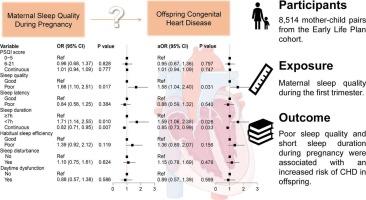孕期产妇睡眠与后代先天性心脏病:一项出生队列研究的发现
IF 3.3
2区 医学
Q2 PSYCHIATRY
引用次数: 0
摘要
先天性心脏病(CHD)是活产婴儿中最常见的解剖畸形,与各种产前因素有关。产妇睡眠障碍是怀孕期间的一个常见问题,与不良妊娠结局和新生儿健康问题有关。然而,关于母亲睡眠障碍与后代冠心病风险之间关系的流行病学证据仍然有限且不确定。目的探讨孕妇妊娠期睡眠障碍与子代冠心病风险的关系。方法从早期生活计划队列中选取8514对母子进行研究。匹兹堡睡眠质量指数(PSQI)用于评估怀孕前三个月的睡眠特征。通过超声诊断冠心病。采用Logistic回归模型分析孕妇妊娠期睡眠问题与子代冠心病风险的关系。结果母亲睡眠质量差(OR = 1.58, 95% CI: 1.04 ~ 2.40)和睡眠时间短(OR = 1.59, 95% CI: 1.06 ~ 2.38)与子代冠心病风险增加均有显著相关性。亚组分析显示,睡眠质量差与男性后代患冠心病的风险显著相关(OR = 1.75, 95% CI: 1.04-2.96),但这种关联在女性后代中不显著。在有白天午睡习惯的母亲中,较短的睡眠时间(7小时)与较高的冠心病风险显著相关(OR = 1.82, 95% CI: 1.06-3.14)。当将睡眠时间作为连续参数进行检查时,白天午睡组的睡眠时间较长与冠心病风险较低相关(OR = 0.81, 95% CI: 0.66-0.98)。结论孕期睡眠质量差和睡眠时间短与后代患冠心病的风险增加有关,而在男性后代和白天午睡的母亲中观察到的关系更为明显。白天小睡可能对降低后代患冠心病的风险有潜在的保护作用。由于这是一项观察性研究,不能建立因果关系,需要在未来的研究中进一步验证。本文章由计算机程序翻译,如有差异,请以英文原文为准。

Maternal sleep during pregnancy and offspring congenital heart disease: Findings from a birth cohort study
Background
Congenital heart disease (CHD) is the most common anatomical malformation among live-born infants and has been linked to various prenatal factors. Maternal sleep disturbances, a common issue during pregnancy, have been associated with adverse pregnancy outcomes and neonatal health problems. However, epidemiological evidence on the association between maternal sleep disturbances and the risk of CHD in offspring remains limited and inconclusive.
Objective
This study aimed to evaluate the association between maternal sleep disturbances during pregnancy and the risk of CHD in offspring.
Methods
A total of 8514 mother-child pairs from the Early Life Plan cohort were included in this study. The Pittsburgh Sleep Quality Index (PSQI) was used to assess sleep characteristics during the first trimester of pregnancy. CHD was diagnosed through ultrasound. Logistic regression models were employed to analyze the association between maternal sleep problems during pregnancy and the risk of CHD in offspring.
Results
Poor maternal sleep quality (OR = 1.58, 95 % CI: 1.04–2.40) and short sleep duration (OR = 1.59, 95 % CI: 1.06–2.38) were both significantly associated with an increased risk of CHD in offspring. Subgroup analysis revealed that poor sleep quality was significantly associated with a higher risk of CHD in male offspring (OR = 1.75, 95 % CI: 1.04–2.96), but this association was not significant in female offspring. Among mothers with a habit of daytime napping, shorter sleep duration (<7 h) was significantly associated with a higher risk of CHD (OR = 1.82, 95 % CI: 1.06–3.14). When examining sleep duration as a continuous parameter, longer sleep duration was associated with lower risk of CHD (OR = 0.81, 95 % CI: 0.66–0.98) in daytime napping group.
Conclusions
Poor sleep quality and short sleep duration during pregnancy were associated with an increased risk of CHD in offspring, while the observed relationships appeared more pronounced in male offspring and among mothers who engaged in daytime napping. Daytime napping might have a potential protective effect in reducing the risk of CHD in offspring. As this is an observational study, a causal relationship cannot be established, and further validation is needed in future research.
求助全文
通过发布文献求助,成功后即可免费获取论文全文。
去求助
来源期刊
CiteScore
7.40
自引率
6.40%
发文量
314
审稿时长
6.2 weeks
期刊介绍:
The Journal of Psychosomatic Research is a multidisciplinary research journal covering all aspects of the relationships between psychology and medicine. The scope is broad and ranges from basic human biological and psychological research to evaluations of treatment and services. Papers will normally be concerned with illness or patients rather than studies of healthy populations. Studies concerning special populations, such as the elderly and children and adolescents, are welcome. In addition to peer-reviewed original papers, the journal publishes editorials, reviews, and other papers related to the journal''s aims.

 求助内容:
求助内容: 应助结果提醒方式:
应助结果提醒方式:


